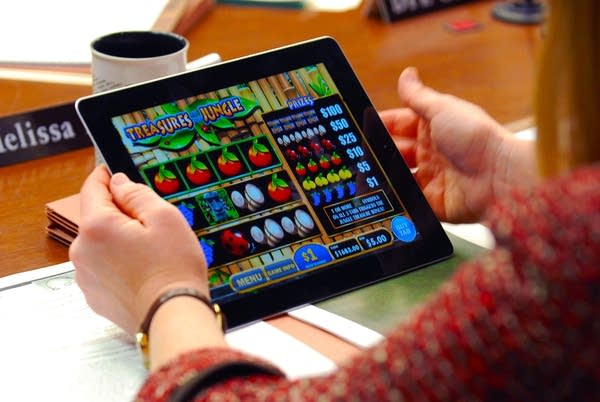Expanding gambling oversteps stadium financing bargain, critics say
Go Deeper.
Create an account or log in to save stories.
Like this?
Thanks for liking this story! We have added it to a list of your favorite stories.

Many of the players in Minnesota's stadium drama said Friday they are not happy that the Minnesota Lottery is contemplating a bigger role in gambling to help shore up the original plan to pay the state's share of the project.
Lottery officials say they think they can use electronic gambling to potentially make up for the shortfall in expected electronic pulltab revenues.
Ed Van Petten, director of the state lottery, said that his agency could expand games from scratch-off tickets and lotto numbers to video displays, even big-screen televisions.
"There are games out there that can be played on a monitor. Keno, for instance, is a possibility if it's acceptable to all of the players, including the governor, obviously, because he's the main decision-maker from this end," Van Petten said.
Turn Up Your Support
MPR News helps you turn down the noise and build shared understanding. Turn up your support for this public resource and keep trusted journalism accessible to all.
"There are a number of possible games. There are monitor games that play poker. There are monitor games that involve horse and dog and car races, simulated races. There are quite a number of options out there," he said.
"If the bill was sold to Minnesotans that way, it never would have passed."
But even lawmakers who supported the stadium deal say that is not what they bargained for. The stadium bill authorized the lottery to start a sports-themed game as a fallback financing plan in case electronic pulltabs didn't work out.
DFL House Speaker Paul Thissen said more electronic gambling would be overreaching by the lottery.
"I don't think they have that authorization in the stadium law. That's pretty clear," Thissen said.
But others are not so sure. Republican Sen. Sean Nienow of Cambridge opposed the stadium, and said the brief mention of the state lottery in the stadium bill -- with virtually no restrictions spelled out -- was one of the reasons he did not like the plan.
"This is not defined. It's a sports-themed game run by the Minnesota lottery. That means they could be setting up little mini-casinos in thousands of locations all across the state of Minnesota," Nienow said. "I told people that at the time, and now we're looking at a real possibility.
"And if the bill was sold to Minnesotans that way, it never would have passed."
Some of the groups already involved in gambling in the state say they will push back to stop a lottery expansion.
[image]
Executive director Al Lund of Allied Charities, the industry trade group that represents about half of the charitable gambling operators in Minnesota, acknowledges that electronic pulltab games have been slow to take hold and are not making nearly the money supporters had hoped.
"Given the opportunity to affect the rollout that we think we can, that this time next year will be the time to look and see if any stop-gap funding is actually needed," Lund said.
Lund also said he does not think the situation is as dire as critics have painted it. He said electronic bingo is still being evaluated, and could significantly boost future revenues. Initially the state will need more than $30 million annually to pay for the stadium. It is no way clear that electronic lottery games are necessary, Lund said.
"Charities believe that we're going to send in between $8 (million) and $10 million into that fund this year, and certainly eight to 10 (million) next year. So the real number of the gap -- the shortfall -- we anticipate is going to be between $10 and $15 million," Lund said. "That's way different than $36 million. I know it's real money and its big money, but it's not $36 million."
Minnesota's other major gambling player, the state's 18 tribal casinos, say they won't wait to see how electronic pulltabs and bingo play out.

A lottery expansion into electronic games isn't legal, says Minnesota Indian Gaming Association executive director John McCarthy, and his group will fight it.
"Keno is a major step in a direction for expansion of gambling. Poker is a major step. I mean, what's the difference? That's slots in bars. That's what that is," McCarthy said. "It represents thousands of machines coming into the state and very much unlike the electronic pulltabs. This is just overstep, is what it is."
But with electronic pulltabs revenue returning cents on the dollar, Gov. Mark Dayton's administration has said it may have to decide this summer what role the lottery will play in the stadium financing.



